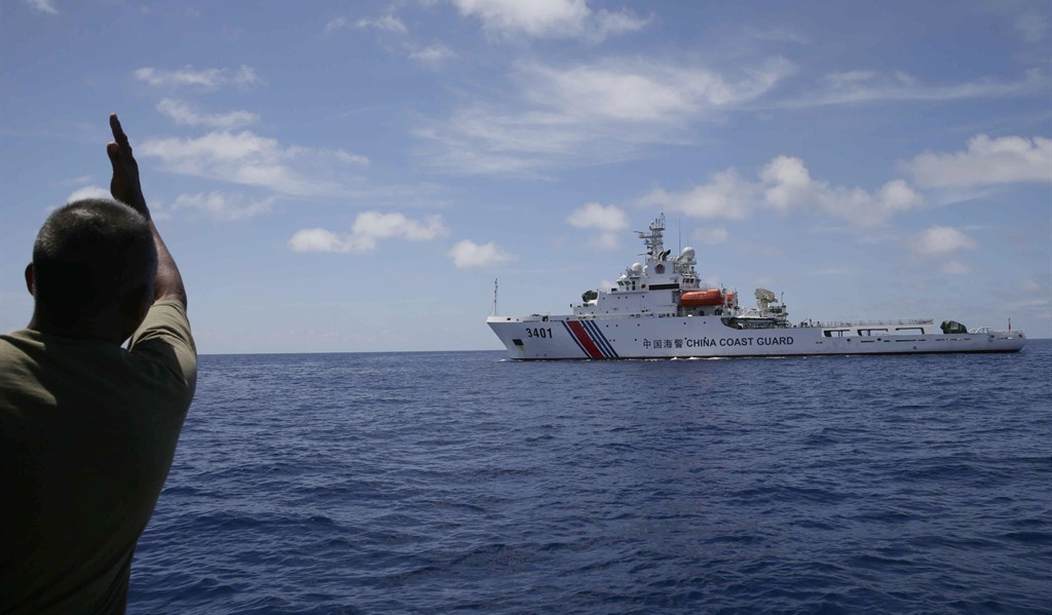Just because it's not front page news at the moment doesn't mean this may not be one of the most important stories in the world right now. As discussed here and here, the conflict between China and the Philippines has been escalating for most of the past year. China claims that all of the islands in the South China Sea belong to it and the Philippines refuses to comply, especially with regard to island that are within its Exclusive Economic Zone.
China has been harassing Philippines' ships and fishing vessels for months but last week it threatened to release proof of an unwritten agreement it claims to have made with former President of the Philippines Rodrigo Duterte. Duterte has denied making any such deal and the current president has said that even if the story were true, he would rescind the deal given that even China admits there was no written agreement. In essence, China has been demanding that the Philippines stick to an unenforceable conversation.
This week, China escalated the situation again by referring to another off-the-record agreement it claims to have made with the Philippines.
National Security Adviser Eduardo Año did not mince his words when discussing about the Chinese embassy claim that there is a “new model” between both countries to address the maritime issues in Ayungin (Second Thomas) Shoal.
On Saturday, an unidentified Chinese embassy spokesperson said “new model” to manage the tensions in the shoal where a Philippine navy outpost is located was allegedly approved by officials in the Department of National Defense and the National Security Advisor...
“No one in the Philippine government is, nor have been, empowered nor authorized to enter into or commit to any sort of agreement, understanding, or arrangement — more so informal ones, by our President,” he said.
China's response to this denial was to threaten to release an audio recording of the alleged agreement.
In the alleged Jan. 3 phone call, Vice Admiral Alberto Carlos, head of the Philippine military’s Western Command, agrees to a “new model” in handling resupply missions to the Philippine-occupied Second Thomas Shoal in the South China Sea, according to a transcript provided by Chinese officials to Bloomberg News.
The transcript may be released to the public within days, said the officials, who asked not to be identified because they weren’t authorized to speak on the record.
The audio hasn't been released yet but the Chinese Embassy in Manilla did release a transcript to certain media outlets on Tuesday. The Philippines has denied such an agreement was made and suggested a transcript and even a recording could be faked.
“Transcripts can easily be fabricated, and audio recordings can be manufactured by using deep fakes. These reports only [aim] to serve as a distraction from the China Coast Guard’s ongoing aggressive behaviour in the West Philippine Sea,” Armed Forces of the Philippines chief of staff Romeo Brawner said...
Collin Koh, a senior fellow at the S. Rajaratnam School of International Studies in Singapore, said the threat could be part of Beijing’s strategy to counter Manila’s “assertive transparency” tactics to publicise its maritime incidents with China at the sea.
“That is effective and has put China on the back foot, so Beijing needs to sort of wrestle back the initiative,” he said.
Today, National Security Adviser Año called for Chinese diplomats to be expelled from the country over the incident.
The Philippines' national security adviser called on Friday for Chinese diplomats to be expelled over an alleged leak of a phone conversation with a Filipino admiral in a significant escalation of a bitter row over the South China Sea.
China's embassy in Manila had orchestrated "repeated acts of engaging and dissemination of disinformation, misinformation and malinformation", with the objective of sowing discord, division and disunity, Eduardo Ano said in a statement.
One analyst said that even if China had such a conversation with a representative of the Philippines, such conversations are not generally seen as binding or enforceable.
Manila-based political analyst Julio Amador said expelling diplomats should be part of the Philippines' diplomatic tool kit and Chinese embassy officials had shown they did not value their working relationships with Filipino officials.
"Diplomacy is based on trust, yet China is trying to make it look like all meetings between its diplomats and Philippine government representatives are negotiations with binding results," he said.
We could see a real diplomatic break in the next few days, one which could make the next confrontation in the South China Sea even more aggressive.








Join the conversation as a VIP Member